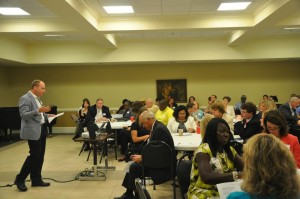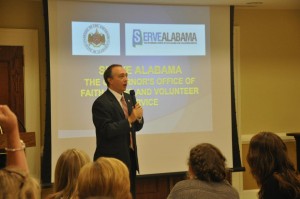August 7th, 2012
A guest post by Law and Policy Intern Ashley Rhea, a rising 2L at APP Cornerstone Member Cumberland Law School:
On July 24, nearly 70 higher education faculty, staff, students and community partners gathered at APP’s Birmingham office for our Summer Higher Education Alliance Workshop “Developing a Long-Term Vision to Unlock Alabama’s Potential.”

Kent Andersen, the director of the Hess Center for Leadership and Service at APP Cornerstone Member Birmingham-Southern College, opened the workshop with two questions:
What are the essential features of a healthy community?
What are the specific barriers and/or facilitators to a healthy community?
Cristin Foster of the David Mathews Center for Civic Life offered a framework for defining healthy communities using the Alabama Civic Health Index. Cristin noted that “Alabama has a strong civic foundation, but we still have a long way to go,” specifically in engaging students and young adults.
APP Board Member and Auburn University Director of Public Service Ralph Foster, Auburn Service-Learning Coordinator Joyce Thomas-Vinson, Habitat for Humanity Alabama Director Art Pearce, and APP AmeriCorps*VISTA Alumnus J.T. Moore discussed House United, which brought together students from APP Cornerstone Members The University of Alabama and Auburn Universityto rebuild communities in Tuscaloosa and Baldwin Counties.
“House United taught us that, [as a community], we are stronger as a team,” Ralph said. “ What makes a difference are the relationships built between people of different backgrounds.”
APP Board Member Humphrey Lee, President of APP Cornerstone Member Northwest-Shoals Community College, introduced Phi Theta Kappa members Jeremy Gates and Gage Prince. Jeremy and Gage talked about their work to promote storm readiness on the Phil Campbell campus of NWSCC, including a producing a video.
“Students had no idea where to go to keep them safe on campus during a tornado,” said Jeremy. Now, everyone at NWSCC follows the National Incident Management System.
Keynote Speaker Jon Mason, director of Serve Alabama: The Governor’s Office of Faith-Based and Volunteer Service, emphasized that while meeting short-term needs after a disaster is important, the key to rebuilding our communities lies in a collaborative long-term recovery effort.
“We must have collaboration in order to be successful,” said Jon. “Every group in our state has something unique to offer.”
When Kent led the day’s closing reflection, workshop attendees said that listening to community needs and building relationships will unlock Alabama’s potential.
How is your community listening to each other and building collaborative relationships? Please share your story with us at [email protected]
